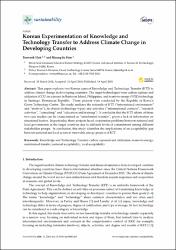/admin/item?itemID=33f99d32-9f17-43f7-a0f3-4ec540866d5b
Korean experimentation of knowledge and technology transfer to address climate change in developing countries

View/
Type of Access
OpenMaterial Type
ArticleType of Content
Scientific researchSubject
Gestión ambiental - Políticas y normasGestión ambiental - Planificación
Cambio climático
Energías renovables
Tecnología
Language
EnglishCollection
- Investigación ambiental [1748]
Metadata
Show full item record| Abstract: | This paper explores two Korean cases of Knowledge and Technology Transfer (KTT) to address climate change in developing countries. The target technologies were carbon capture and utilization (CCU) in a project in Bantayan Island, Philippines, and waste-to-energy (WTE) technology in Santiago, Dominican Republic. These projects were conducted by the Republic of Korea’s Green Technology Center. The study analyses the rationale of KTT (“international environment” and “motives”), its objects (technology types) and activities (“informational contacts”, “research activities”, “consulting” and “education and training”). It concludes that the KTT efforts of these two case studies can be characterized as “uninformed transfer”, given a lack of information on situational factors. In particular, these projects faced cooperation problems between national and local governments in the target countries due to different levels of commitment among different stakeholder groups. In conclusion, this study identifies the implications of an acceptability gap between national and local actors in renewable energy projects of KTT. |
| Author(s): | Huh, Taewook
Kim, Hyung-Ju |
| Date: | 2018 |
| Published: | Sustainability, 10(4), 1263 |
| Citation: | Huh, T., & Kim, H. J. (2018). Korean experimentation of knowledge and technology transfer to address climate change in developing countries. Sustainability, 10(4), 1263. Recuperado de: |
| URI: | https://bvearmb.do/handle/123456789/5330
|

